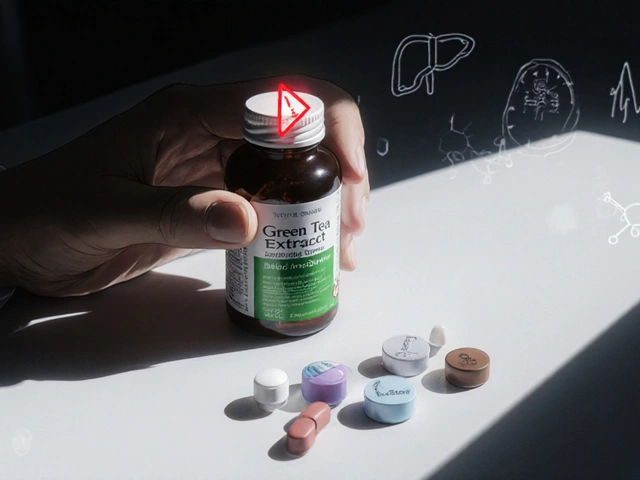Medication Side Effects – What They Are and Why You Should Care
When dealing with medication side effects, unwanted symptoms or reactions that appear after taking a drug. Also known as adverse drug reactions, it is a key sign that the body is reacting to the drug’s chemistry. Understanding these reactions helps you stay ahead of problems before they get serious. medication side effects can range from a mild headache to a life‑threatening rash, and the difference often comes down to dosage, interactions, and individual health factors.
One of the biggest triggers is drug interactions, the way two or more medicines affect each other’s performance in the body. When two drugs compete for the same metabolic pathways, the level of one can skyrocket, leading to intensified side effects. For example, mixing chlorambucil with certain antibiotics can amplify nausea and lower blood counts. That’s why a quick check of what you’re already taking can prevent a cascade of problems.
Why Patient Safety Depends on Knowing the Details
Another essential piece is patient safety, the practice of protecting patients from preventable harm during health care. Safety isn’t just a hospital duty; it starts at home when you read a label or ask your pharmacist about dosage adjustments. Knowing the typical dosage guidelines for a drug – the amount, timing, and whether food affects absorption – cuts down the odds of an overdose, which is a common cause of severe side effects.
Take ciprofloxacin, sold under names like Baycip. It’s effective against many infections, but it can also irritate tendons, especially in older adults. The risk climbs if you also take steroids or are dehydrated. By linking the drug to its specific side‑effect profile, you get a clearer picture of what to monitor: tendon pain, swelling, or sudden weakness. That knowledge turns a vague warning into a practical alert you can act on.
Even over‑the‑counter options have hidden pitfalls. Naproxen (Aleve) eases pain, yet it can stir up stomach ulcers if you combine it with alcohol or another NSAID. The same principle applies to herbal supplements; some – like St. John’s wort – can interfere with antidepressants, making serotonin syndrome more likely. In short, every extra ingredient adds a variable to the side‑effect equation.
When a new symptom shows up, the first question should be: “Is this a known side effect of any medicine I’m taking?” A quick search in a reliable database (like PharmaDirect) tells you if the reaction is common, rare, or possibly unrelated. Knowing the typical onset time helps too – some effects appear within hours, others after weeks of therapy.
Beyond the drug itself, personal health status shapes the side‑effect landscape. Kidney or liver disease can slow drug clearance, raising blood levels and intensifying reactions. Age matters; children and seniors often need adjusted doses because their bodies process medicines differently. Likewise, genetics can make a person a fast or slow metabolizer, affecting how quickly a drug is broken down.
Managing side effects isn’t just about stopping a drug; it’s about tweaking the treatment plan. Your doctor may lower the dose, switch to a safer alternative, or add a protective medication. For instance, adding a proton‑pump inhibitor can shield the stomach when you must stay on an NSAID, reducing ulcer risk. Those adjustments turn a potentially dangerous situation into a manageable one.
Keeping a simple log can be a game‑changer. Write down each medication, dose, time taken, and any new symptoms you notice. Over a week, patterns emerge: maybe a headache appears only after you take a certain supplement. This record gives your health‑care provider concrete data, speeding up the process of finding the culprit.
Finally, remember that side‑effect information evolves. New studies may reveal rare reactions that weren’t on the label a few years ago. Staying updated – by checking trusted sources quarterly – ensures you’re not caught off‑guard by a newly reported risk.
Below you’ll find a curated list of articles that dive deeper into specific drugs, interaction warnings, and practical safety tips. Whether you’re looking for detailed comparisons, dosage advice, or ways to protect yourself from common adverse reactions, the collection gives you clear, actionable insight you can use right away.
9

Facial Flushing from Medications: Common Triggers and How to Find Relief
Facial flushing from medications is a common side effect caused by drugs that dilate blood vessels. Learn which medications trigger it, how to recognize it, and practical ways to reduce or manage the redness and heat without stopping essential treatments.
21

Inactive Ingredient Differences: Why Your Generic Medication May Feel Different
Generic medications save money but can contain different inactive ingredients that affect how you feel. Learn why some people notice side effects after switching-and what to do about it.
29

Orthostatic Hypotension from Medications: Why You Feel Dizzy When You Stand Up
Dizziness when standing up could be caused by your medications. Learn which drugs trigger orthostatic hypotension, how to recognize it, and what steps you can take to reduce dizziness and prevent falls.
17

Decadron (Dexamethasone) vs. Common Alternatives: Benefits, Risks, and Usage
A detailed guide comparing Decadron (dexamethasone) with other steroids, covering mechanisms, dosing, side‑effects, and how to choose the right option.




